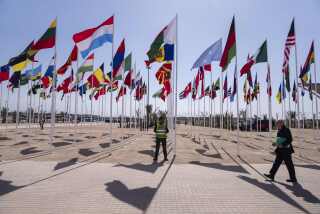A Time for Change at the IMF
- Share via
Michel Camdessus, managing director of the International Monetary Fund, has presided over the organization for nearly a quarter of its history. His resignation, announced last week, raises the question of whether the institution itself and its role in international finance are ripe for a change. The answer, one that Camdessus himself acknowledges, is, yes, the IMF needs to adapt to the new global economic reality, and it must be led by someone who is both a financial expert and a skilled diplomat.
Set up on the ruins of World War II, the IMF was designed to help its member countries keep the value of their currencies steady. When a country experienced troubles, the IMF was the cavalry that rode in with help to prop up the currency while the government tried to get its economic house in order. Its standard plan has been to make the afflicted country sign a deal demanding often draconian belt-tightening by the population, increases in interest rates to attract new capital and reforms to eliminate the worst excesses of corruption.
This worked, especially in the early 1980s when the flow of capital was restricted and crises were caused by poor economic management. But the overall long-term result is not encouraging. Some 80 countries have ended up as chronic patients in the IMF ward. Russia is a good example. Over the years, the IMF has spent nearly $23 billion there, but the country’s economy is a shambles, corruption is rampant, domestic capital is fleeing in panic and the salaried population, squeezed ever more tightly by the tax collector, is worse off than ever. On top of it, the IMF doesn’t even know how much of its money has been stolen.
But, as Mexico in 1995 and parts of Southeast Asia in the last two years showed, crises will strike even countries with improving management. Hundreds of billions of dollars move across the globe each day, and hitches in the flow of the money occur. A hitch can quickly grow into a panic, and a run on a country’s reserves can ruin a currency in a matter of days. That’s where the IMF can be very useful--as a supplier of quick, ready cash to tide a country over the period of panic. For greater speed, the IMF should pre-approve countries for its loans, provided they meet strict criteria of open, disciplined economic governance.
When Camdessus leaves early next year, he should be replaced by another financial specialist either from a central bank or a ministry of finance. The next IMF director must get along with the U.S. Treasury secretary because, let’s face it, the United States speaks with the loudest voice at the IMF. Still, the new director will have to be able to resist political pressure even from Washington. An IMF driven by politics rather than economic considerations is an IMF that fails.
More to Read
Sign up for Essential California
The most important California stories and recommendations in your inbox every morning.
You may occasionally receive promotional content from the Los Angeles Times.













